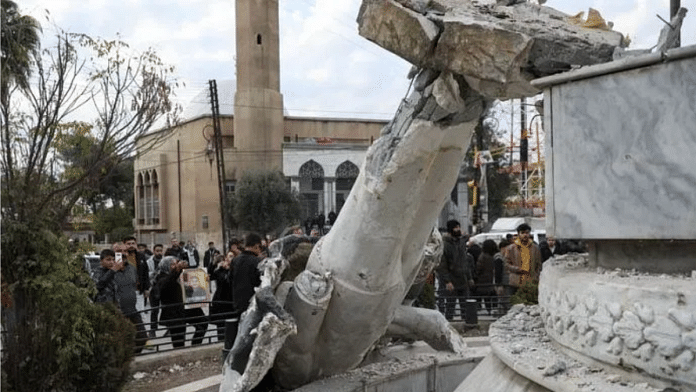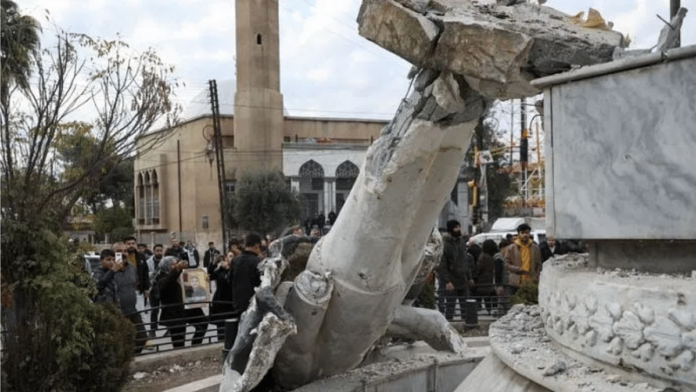


Unlike the West, China maintained a friendly stance toward Syria’s ousted president Bashar al-Assad, whose high-profile six-day family visit to China last year further solidified this relationship.
Following the collapse of Assad’s regime, China’s foreign ministry issued a neutral statement. “China is closely following the development of the situation in Syria, and the future and destiny of Syria should be decided by the Syrian people,” spokesperson Mao Ning said.
Gao Wanying, a researcher at the Institute of Middle East Studies of the China Institutes of Contemporary International Relations, pointed out that internal political changes in Syria could significantly alter the broader geopolitical dynamics of the Middle East. Assad, often described as pro-China by Chinese internet users, was a crucial partner for Beijing. This relationship was particularly evident in discussionspertaining to the Belt and Road Initiative (BRI), which saw Syria playing a key role in infrastructure, trade, and economic projects vital to Beijing’s regional strategy. However, these projects now potentially face disruption following Assad’s departure.
Syria’s strategic location aligns with China’s New Silk Road vision, serving as a potential conduit for trade routes between China and Europe. One commentator pointed out a critical logistical opportunity: a railway connecting Iran to Iraq, passing through Syria (via Latakia or Tartus), and linking to the China-Europe rail network. This route is viewed as an alternative amid growing mistrust between China, Russia, and Turkey.
Qin Tian, deputy director at the Institute of Middle East Studies of the China Institutes of Contemporary International Relations, warnedabout the security vacuum created by Assad’s departure. He noted that Syria has been a source of refugee outflows and terrorism, and this instability could threaten Chinese citizens and investments in the region. A Weibo user also expressedconcern that while Assad upheld a secular regime, Syria could soon fall under the influence of religious extremists, possibly providing a foothold for exiled Uyghurs—a growing security concern for China.
Despite these challenges, Chinese analysts largelyagree that the economic impact of Syria’s turmoil on China will be relatively modest. Trade cooperation between the two countries remains limited, with trade volumes only reaching hundreds of millions, and investments are in the tens of millions—figures that are negligible within the scale of China’s economy. In contrast, the US seems to benefit from this regional instability, capitalising on the chaos for strategic leverage. China, on the other hand, prioritises stability and long-term planning to foster sustainable regional relationships in the region.
Chinese online discussions often blame US interference for exacerbating Syria’s instability, suggesting that Western support for “democracy” played a key role in sparking the civil war that tore the country apart. While many humanitarian organisations have withdrawn, citing the futility of aid efforts, Russia and Iran remain committed to strengthening their influence in the region. By contrast, Chinaportrays itself as the sole nation supporting Syria’s reconstruction projects, emphasising its focus on regional stability and cooperation.
Also read: Hayat Tahrir al-Sham’s rise in Syria concerns everyone. It’s the era of indivisible security
Chinese discourse indicates that China’s influence in Syria remains constrained and any substantial intervention would carry significant risks. The diminishing influence of Russia has allowed greater involvement by the US, Israel, and Turkey, an indirect development that complicates Beijing’s strategic interests, particularly as regional security threats escalate.
Should instability in Syria spillover, it could potentially destabilise the entire Middle East, heightening security risks for China’s personnel and assets across the region. The idea of deploying troops to combat terrorism is generally rejected within China. The consensus is that Syria’s situation is a protracted civil war, not a straightforward terrorist threat, and China lacks the military, logistical, and intelligence infrastructure necessary for effective ground operations.
Strategist Xie Xiaowen warned that a collapse of Assad’s regime would undermine China’s ongoing peace-building initiatives, necessitating a strategic reassessment. China now would need a more flexible approach, prioritising strategic adaptability over rigid planning.
Niu Xinchun, a professor at the China Institute of Arab Studies at Ningxia University, emphasised that China aims for a smooth and stable transition of power. Such an outcome would align with Beijing’s long-term objectives of maintaining regional influence, securing economic partnerships, and protecting investments.
There is a widespread but flawed belief in the West that China’s influence in the Middle East is limited, as seen in the ousting of Assad and China’s inability to resolve the Israel-Hamas conflict. While China’s influence in Middle Eastern dynamics may not be as strong, Beijing seeks to avoid supporting one regime over another. China’s presence in the region is driven by self-interest, showcasing cautious diplomacy.
Despite having strategic interests in Syria and the broader Middle East, China seems more inclined to remain a passive observer, carefully monitoring developments without committing to direct intervention. With Assad now exiled in Moscow, and Syria in disarray, with multiple actors vying for influence, China appears content to wait and reassess the situation before committing to a more active role.
One certainty remains: regardless of who holds power in Syria, China will reinvest in reconstruction, driven by its long-term strategic interests. Beijing will patiently wait before deciding on its future role and commitments in Syria and the Middle East.
Sana Hashmi is fellow at the Taiwan-Asia Exchange Foundation. She tweets @sanahashmi1. Views are personal.






